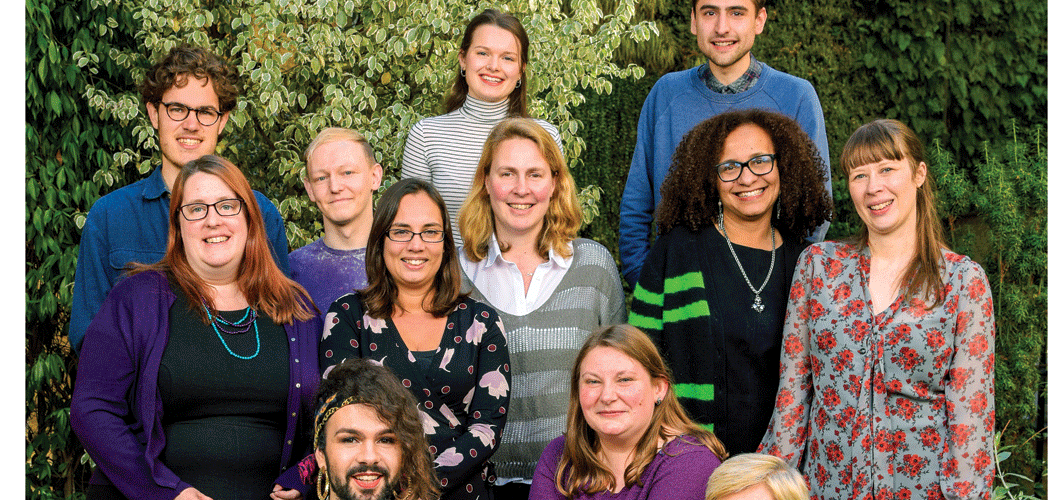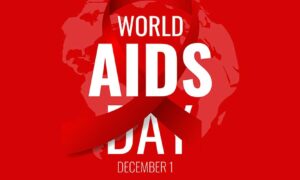For nearly 30 years, the NAT has championed the rights of people living with HIV. From free HIV treatment for everyone living in the UK to more recently piling pressure on NHS England to commission a trial for PrEP, the NAT has been at the forefront of decisions and policies introduced to improve the lives of people affected by HIV. Here you can meet the team and find out how you can support their invaluable work.
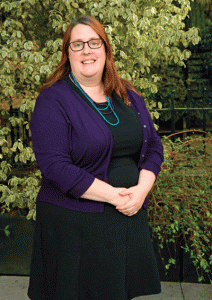
Deborah Gold – Chief Executive
What have been NAT’s biggest achievements during your tenure?
We won two court cases against the NHS in England, which resulted in them agreeing to fund PrEP (an HIV prevention pill) for at least 10,000 people. That felt pretty big, but we’ve had loads of other achievements since I’ve been in post. For example, soon after I joined we learned that the Department of Health was planning to halve the amount is spent on HIV prevention – and we ran a huge campaign which convinced them to scrap their plans.
What are you most proud of?
I’m enormously proud that I work every day with such committed, knowledgeable people, and that we make such a difference. I’m proud of all the wins we have that never make the papers – when we speak out for people living with HIV in vulnerable situations – such as if they are in prison or immigration detention. I’m honestly just honoured to have the chance to work at NAT.
What are the challenges you face as a small charity?
We are much smaller than our name makes us sound, so we have to be careful to target our energy where we can be the most effective. Our biggest challenge though is how hard it is to fundraise. We do such important work, but lots of people don’t know about us, and it’s a tough financial climate for people to donate – so we struggle to be financially secure or have enough money to do everything we’d like to.
What are the common misconceptions the public can have of NAT?
People think we are huge whereas in fact we are pretty small – we just achieve a lot! People often don’t understand what policy is and why it’s so important, but at NAT we know that changing policy has a positive impact on huge numbers of people. Sometimes people have misconceptions about how much money charities have, thinking we are profligate. At NAT, staff are so careful with money we have to think ‘should we send those letters first class or second class?’
Do you feel angry that you receive little money from the government compared to other HIV charities?
Actually no. As a policy and campaigning organisation we think it’s really important that we are seen as fearless, outspoken, credible and above all independent. To do that, as it’s the Government we are often trying to influence, it’s best we limit how much funding we get from them (which at the moment is very little). But that does of course create an extra fundraising challenge for us.
The NAT turns 30 this October – how are you planning to mark the occasion?
We’re launching a campaign to end HIV. We want to inspire people to see what is possible if we just commit energy, resources and political will. And, of course, throughout the year there will be other opportunities to support us.
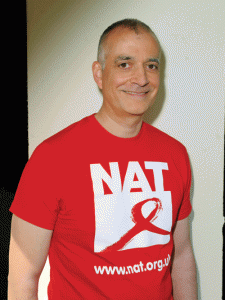
Yusef Azad – Director of Strategy
Explain your role.
My role is to co-lead our policy and campaigning activity, which of course is the heart of NAT’s work. I’m also expected to think longer-term, widely and deeply about HIV and the future context in which we work.
Why has it taken so long to get PrEP?
Two reasons. The first is that it takes a long time to get anything in the new NHS, especially if it’s going to cost more money in the short-term. PrEP joined the queue along with a lot of other proposals. Secondly, as your readers know, NHS England tried at the last minute to walk away from a decision. We successfully challenged them in the courts and we are hopefully more or less back on track, but that added a year’s further delay.
Where are we now with PrEP?
A further three-year clinical trial, funded by NHS England and managed by Public Health England, is due to go live in the next few months, which we hope will make PrEP accessible across the country and provide sufficient PrEP for those who are eligible and want it. At the same time we need to ensure planning is happening now for longer-term provision of PrEP once the trial is concluded. We’ll keep Boyz readers updated!
Why was lobbying for poppers such an important issue?
We don’t claim every issue is equally important – we wouldn’t put our work on poppers on a par with that on PrEP! But given how many gay men used poppers, we felt it was crazy, and dangerous for gay men’s health, to criminalise the sale of poppers with all the risks of unregulated supply from drug dealers. Our work on HIV is done in the context of a commitment more broadly to gay men’s health.
What are some of the challenges the NAT still faces with its work?
Undoubtedly the great challenge is the lack of funding for public services, which include both gay men’s health promotion and support services for people with HIV. How do we keep services in place and effective in a time of austerity? This issue could well become even more desperate if current government plans for public health funding go ahead. Then there’s PrEP – it’s nearer than it was but we won’t be satisfied until it really is available for everyone who needs it.
And then there are people who are left behind or too often ignored – people who use drugs (including those who are having problems with chemsex), migrants, prisoners… The list goes on. We are unashamedly committed to equality and human rights. Our policy work aims to ensure everyone gets the same high quality support around HIV.
How has NAT changed since it began?
At the very beginning NAT actually dispensed government funding to local HIV organisations. Things are very different now – we are a charity like any other very much in need of funding ourselves – we get next to nothing from national or local government. Over the years we have become very clear on our added value being as an independent organisation focussed on policy and campaigning – supporting our service delivery colleagues in their work but not doing direct service delivery ourselves. And we’ve been delivering – on PrEP, on free HIV treatment for everyone living in the UK, on resisting the criminalisation of poppers, on ending questions about your HIV status when applying for a job, in stopping the Government halving funds to the national HIV prevention programme – just a few examples.
And how do you see NAT evolving over the next 10 years?
I think in many ways we will remain the same – continuing to focus on policy and campaigning. But we will also change because HIV changes and the issues change. Prevention issues are going to change with the arrival of PrEP. Treatment issues could change if in the future we get long-acting anti-retrovirals which you don’t need to take daily. I suspect we will be focussing increasingly on the importance of care and services being of an equally high standard wherever you are in the country. I think for gay men our work on HIV will have to be placed absolutely within a wider policy agenda of good mental health, good sexual health, support around problematic drug and alcohol use, and an end to stigma and homophobia.
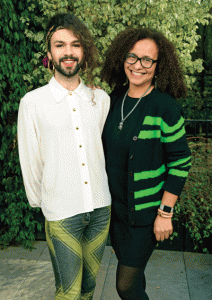
Charlie Alderwick –
Senior Communications Officer
What motivates you to do your job?
The need to fight misinformation. I have only been at NAT a few months and in this short time we’ve had a Northern Irish MP who didn’t know straight people can get HIV. We’ve had the police, including information in their campaigning that suggests you can get HIV from spitting! And we’ve had homophobic headlines boldly claiming PrEP on the NHS would take away money from sick children, which has turned out not to be the case, but the damage has already been done to readers who saw those headlines and haven’t revisited the story.
Almost because HIV medical treatment is better than it has ever been, HIV is in the news agenda less, and this has negatively impacted awareness. Members of the public who can identify the three routes of HIV transmission (without adding incorrect ones) are in a minority. We’re making some good progress on awareness promotion, for instance we’ve been part of a group of organisations fighting for compulsory sex education in schools – which we’ve won! But there is a lot more stigma and misinformation out there than some might realise. Our work isn’t done yet.
As part of NAT’s 30th birthday celebrations, you’ll be launching the Let’s End It campaign – tell us about that.
Instead of focussing on the birthday too much we want to let people know about all the positive change NAT has been responsible for, as well as what we need to do next. The full slogan of the campaign is ‘You’ve helped us fight HIV; now let’s end it.’ We want to use the anniversary as an opportunity to big up our supporters as much as ourselves.
Susan Cole – Community Engagement Officer
Explain your role.
I work closely with the HIV community ensuring NAT’s work is relevant to current needs and always involves people living with HIV in a meaningful way. I also coordinate NAT’s networks, including the HIV Activists Network, our feisty and effective e-campaigning group.
How can the community help with NAT’s work?
I’d very much encourage all Boyz readers to join the Activists Network. It’s a great way to get involved in NAT’s campaigning work and make a difference, all without having to get off your sofa! We had over a thousand people write to their MP about the need for PrEP and members are currently joining the fight to save HIV support services which are currently facing unprecedented cuts. Although there has been huge advances in HIV treatment, HIV stigma continues to blight the lives of many people and there’s a shocking lack of awareness by the public about the reality of HIV today, so HIV activism continues to be as important today as it was 30 years ago when NAT began.
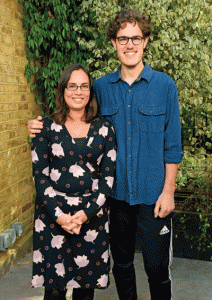
Sharon Coleman – Fundraising Manager
Sum up your role in a sentence or two.
To secure funding for our work so that the team can transform society’s response to HIV, in an environment where fundraising is increasingly challenging for charities working on HIV issues.
How do you currently raise funds?
We need to raise around £800,000 every year from a variety of different sources – companies, trusts and foundations as well as, of course, the public.
We don’t have large multi-year grants and so the more people who get involved with fundraising for NAT the better. Our most popular time of year for fundraising is over World AIDS Day on 1 December when we have hundreds of people – including companies, schools, universities and community groups – raising funds and awareness. It’s a really busy and special time but we also need fundraisers all year round so we can keep making a difference for the whole year. Our amazing fundraisers’ efforts also increase HIV awareness in the community.
Are you planning any specific fundraising campaigns for NAT’s 30th year?
We’ll be running the ‘Let’s End It’ campaign throughout our 30th birthday year and will have a range of activities. It’s a great time for people to get involved with NAT. We’ll launch a new designer brooch, which we hope people will buy and wear with pride, and we’re also working towards a bumper World AIDS Day on 1 December with more people than ever before up and down the country taking part in fundraising activities.
What do you use funds generated for?
The funds generated help us across all of our projects. It’s very hard to seek funds for HIV work in the UK so the money raised goes a long way towards helping us reach our goals. It’s particularly vital for when we need to be proactive and respond rapidly to changing circumstance – where we don’t have time to seek project funds. For example, our decision to challenge NHS England over their decision to abandon its work on PrEP would not have been possible without our supporters. As a small charity every donation makes a massive difference in our ability to keep going.
Ollie Nicholls – Fundraising Officer
Explain your role.
I’m the main point of contact for all our amazing fundraisers: from runners and climbers, bakers and red ribbon sellers. I also communicate what we do to potential supporters and hopefully encourage them to donate towards our work.
I’m always looking for opportunities to build relationships with potential supporters in the community, so if you think you or your organisation has something to offer – whether it’s a donation, a venue for an event, or prizes that we can auction – get in touch!
What events do you encourage members of the public to participate in in order to raise cash for NAT? If a reader wants to fundraise for NAT, how should they go about it?
Currently we’re looking for a team of ‘HIV Heroes’ to get involved in the annual Superhero Run on 14 May. It’s a 5k or 10K run, jog or even a brisk walk around Regent’s Park, where you can don a cape and raise some money for NAT.
Beyond that there’s loads of other stuff that you can do to fundraise for us: sponsored abseils or sky dives, bake sales, fundraising cocktail parties… Our website has loads of ideas, just get in touch if you’d like to take part. You can email [email protected] or phone 020 7814 6751 with your ideas.
For more information about the work of the National AIDS Trust go to nat.org.uk



